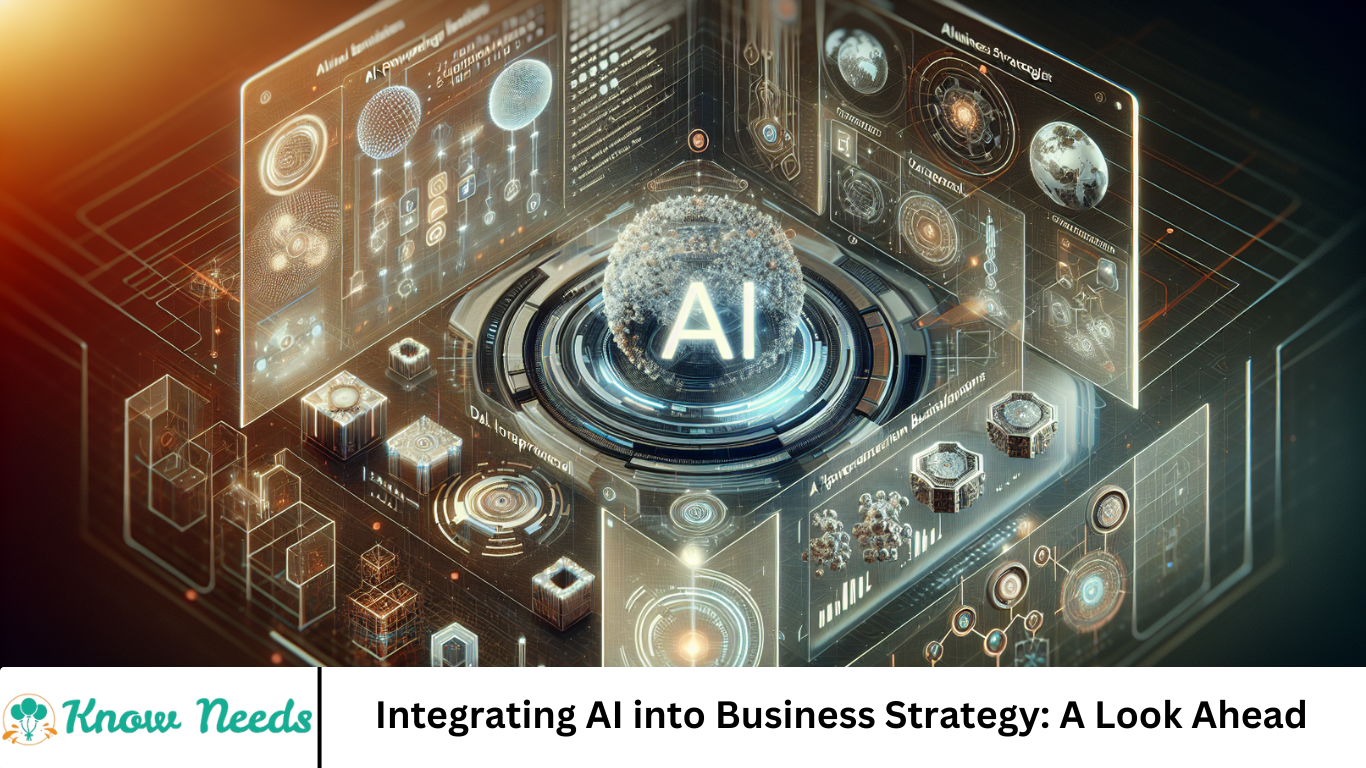Artificial Intelligence (AI) has rapidly evolved from a futuristic concept to a pivotal component in modern business strategies. As we approach 2025 and beyond, AI’s role in reshaping industries and redefining competitive advantage continues to expand.
Businesses across the globe are investing heavily in AI technologies to optimize operations, enhance decision-making, and improve customer experiences.
In this article, we’ll explore how integrating AI into business strategy is no longer optional but essential for sustained growth. We’ll look ahead at trends, benefits, challenges, and practical steps companies can take to successfully embed AI into their strategic frameworks.
More Read: 90 Proven Headline Examples to Instantly Improve Your Click-Through Rate
Why AI Integration in Business Strategy Matters
The global AI market is projected to grow exponentially in the coming years, driven by advancements in machine learning, natural language processing, and automation technologies. AI’s ability to analyze massive data sets, predict trends, and automate complex tasks makes it a powerful tool for businesses seeking efficiency and innovation.
Key Benefits of AI in Business Strategy
- Enhanced Operational Efficiency: AI-powered automation can streamline repetitive processes, reduce human error, and increase productivity.
- Improved Decision-Making: AI algorithms analyze real-time data to deliver actionable insights, enabling smarter, faster decisions.
- Personalized Customer Engagement: AI-driven analytics help businesses tailor their marketing and customer service, improving satisfaction and loyalty.
- Competitive Advantage: Early adopters of AI technologies often outperform competitors by innovating faster and adapting to market changes.
Emerging Trends in AI Business Integration
To understand how AI will shape business strategies in the near future, it’s essential to recognize the key trends driving this transformation.
AI-Driven Predictive Analytics
Predictive analytics uses AI to forecast outcomes based on historical data. Businesses leverage this to anticipate customer behavior, market trends, and supply chain disruptions.
AI in Customer Experience
From chatbots to personalized recommendations, AI technologies are revolutionizing how companies interact with customers. Conversational AI and sentiment analysis are becoming mainstream tools.
Automation and Robotics
Automation isn’t limited to manufacturing. Robotic Process Automation (RPA) is being adopted in finance, HR, and other functions to reduce costs and improve accuracy.
Ethical and Responsible AI
As AI adoption grows, companies are focusing more on ethical AI use — addressing bias, transparency, and data privacy to build trust with customers and regulators.
Challenges in Integrating AI into Business Strategy
While AI offers tremendous potential, integrating it into existing business strategies is complex and poses challenges.
Data Quality and Management
AI systems require vast amounts of high-quality data. Poor data quality can lead to inaccurate insights and faulty decision-making.
Talent and Skills Gap
There’s a shortage of AI expertise, making it difficult for companies to build and manage AI initiatives effectively.
Change Management
Integrating AI often requires a cultural shift within organizations. Resistance to change and lack of AI understanding can hinder adoption.
Ethical Concerns and Compliance
AI deployment must navigate complex legal and ethical frameworks, including regulations around data privacy and algorithmic accountability.
Steps to Successfully Integrate AI into Your Business Strategy
Define Clear Objectives
Start by identifying the business challenges AI can solve. Establish measurable goals such as reducing operational costs, improving customer retention, or accelerating product development.
Invest in Data Infrastructure
Build robust data management systems to collect, store, and process high-quality data, ensuring AI models can deliver accurate insights.
Develop AI Talent and Partnerships
Hire skilled AI professionals and consider partnerships with AI vendors or academic institutions to fill gaps in expertise.
Pilot and Scale AI Projects
Begin with pilot projects to test AI applications, measure outcomes, and refine strategies before scaling across the organization.
Embed AI Ethics and Governance
Implement frameworks for ethical AI use, data privacy, and compliance with relevant regulations to maintain trust and transparency.
Case Studies: AI Integration in Business Strategy
Amazon: AI-Powered Personalization and Logistics
Amazon’s AI-driven recommendation engine accounts for a significant portion of its revenue. The company also uses AI to optimize warehouse logistics and supply chain management, ensuring faster delivery and cost efficiency.
JPMorgan Chase: Automating Financial Services
JPMorgan uses AI to automate contract review and fraud detection, reducing processing time and enhancing security. AI helps the bank make faster, more accurate lending decisions.
Starbucks: AI for Customer Insights
Starbucks employs AI to analyze customer preferences and personalize marketing campaigns. Its Deep Brew AI system powers everything from inventory management to location selection.
The Future Outlook: AI and Business Strategy Beyond 2025
Looking ahead, AI will become increasingly embedded in all aspects of business strategy, driving innovation and transformation at an unprecedented pace.
AI-Enhanced Human Collaboration
Rather than replacing humans, AI will augment employee capabilities, creating smarter workflows and enabling more creative, strategic work.
Industry-Specific AI Solutions
Tailored AI applications will emerge or industries like healthcare, manufacturing, finance, and retail, addressing unique sector challenges.
Real-Time Strategic Adaptation
AI-powered analytics will enable businesses to adapt strategies dynamically based on live market data and competitive insights.
Integration with Emerging Technologies
AI will combine with blockchain, IoT, and 5G technologies to create new business models and revenue streams.
Frequently Asked Question
Why is integrating AI into business strategy important?
Integrating AI into business strategy is crucial because it enhances operational efficiency, enables data-driven decision-making, and improves customer engagement. Businesses that leverage AI can gain a competitive edge by adapting faster to market changes and innovating more effectively.
What are the key benefits of using AI in business?
The main benefits of AI in business include automation of repetitive tasks, predictive analytics for better forecasting, personalized customer experiences, cost reduction, and improved scalability. AI helps businesses make faster, smarter decisions using real-time data.
What challenges do companies face when integrating AI?
Common challenges include poor data quality, lack of skilled AI talent, high implementation costs, organizational resistance to change, and concerns about data privacy and ethical AI use. Overcoming these barriers requires careful planning and strong leadership.
How can small and medium businesses (SMBs) use AI effectively?
SMBs can start small by adopting AI-powered tools like chatbots, customer analytics platforms, or marketing automation systems. Partnering with AI vendors and using cloud-based AI solutions can also help reduce costs and complexity.
What industries benefit most from AI integration?
Industries seeing the most impact from AI include healthcare (diagnostics and patient care), finance (fraud detection and risk analysis), retail (personalized marketing), manufacturing (predictive maintenance), and logistics (route optimization).
How does AI influence strategic decision-making?
AI enhances strategic decision-making by analyzing vast amounts of data to identify patterns, trends, and anomalies. This allows leaders to make more informed choices, forecast outcomes, and respond quickly to market shifts.
What steps should companies take to integrate AI into their strategy?
Companies should:
- Define clear AI objectives aligned with business goals
- Invest in quality data infrastructure
- Build or partner for AI talent
- Start with pilot projects
- Ensure ethical governance and compliance
- Scale AI initiatives across departments once proven
Conclusion
Integrating AI into business strategy is no longer a futuristic ambition—it is a necessity for companies aiming to thrive in a competitive, technology-driven world. By understanding the benefits, recognizing the challenges, and following a clear roadmap for AI adoption, businesses can unlock new opportunities for growth and innovation. As we look ahead to 2025 and beyond, AI will continue to reshape industries, redefine customer experiences, and transform decision-making processes. Companies that embrace AI strategically will not only survive but lead the future of business.


